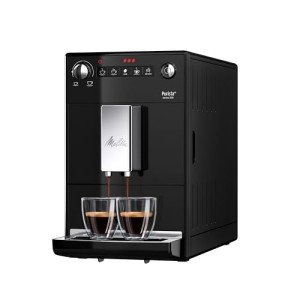What Is It That Makes Energy-Efficient Espresso Machines So Popular?
Energy-Efficient Espresso Machines: A Comprehensive Guide
Worldwide of coffee enthusiasts, espresso machines are frequently considered as necessary home appliances for developing rich, aromatic coffee. Nevertheless, the energy consumption associated with these machines can lead to increased utility expenses and environmental concerns. As Home Espresso Machines become more eco-conscious, energy-efficient espresso machines have emerged as a popular choice. This post aims to check out the features, benefits, and alternatives offered in energy-efficient espresso machines, assisting coffee fans make informed choices.
What Makes an Espresso Machine Energy-Efficient?
Energy-efficient espresso machines are created to reduce energy intake while keeping optimal performance. A number of functions contribute to the energy efficiency of these machines:
Insulation: High-quality insulation assists maintain heat, lowering the energy needed to preserve ideal developing temperature levels.
Smart Technology: Many modern machines are geared up with programmable settings that allow users to set up brewing times and change to standby mode when not in use.
Quick Heat-up Time: Energy-efficient espresso machines typically use advanced heating innovations, such as thermoblocks or PID controllers, to heat water rapidly.
Low Wattage: Machines that run at lower wattages take in less energy in general, making them more effective.
Vehicle Shut-off: Automatic shut-off features make sure that the machine turns off after a specific duration of inactivity, additional minimizing energy waste.
Benefits of Energy-Efficient Espresso Machines
Purchasing an energy-efficient espresso machine can offer several advantages:
Cost Savings: Over time, lower energy usage can cause lowered electrical power expenses.
Ecological Impact: Using less energy lowers carbon footprints, making these machines a more sustainable choice for environmentally conscious consumers.
Improved Performance: Many energy-efficient designs also provide superior brewing technologies, resulting in better-tasting espresso.
Sturdiness: Typically, energy-efficient machines are built with high-quality components, resulting in higher longevity.
Functions to Consider
When selecting an energy-efficient espresso machine, numerous functions need to be taken into consideration:
- Type of Machine: Options consist of manual, semi-automatic, and fully automatic designs, each with varying degrees of user control and automation.
- Brew Quality: Look for machines that utilize high-quality brewing systems to guarantee optimum taste extraction.
- Upkeep: Some machines have self-cleaning features that can conserve energy and effort in maintenance.
- Capability: Depending on individual or family size, machine capability can impact energy intake, with bigger machines often needing more power.
Popular Energy-Efficient Espresso Machines
The marketplace provides a range of energy-efficient espresso machines catering to various needs and preferences. Below are some notable models:
Brand
Design
Secret Features
Energy Consumption
Breville
Barista Express
Integrated grinder, PID temperature control, fast heat-up.
Low
DeLonghi
EC155
Compact size, simple to use, durable build.
Moderate
Rancilio
Silvia
Heavy-duty design, exceptional temperature level stability, and has a low environmental impact.
Moderate
Gaggia
Timeless
Trusted manual operation, resilient brass parts, and efficient steaming capability.
Low
Jura
E8
Completely automatic, smart features, and a detachable brew group for easy cleansing.
Low
Tips for Optimal Energy Efficiency
Aside from picking an energy-efficient design, consumers can embrace several practices to take full advantage of energy performance:
- Preheat: If your machine has a pre-heating function, use it to ensure that the optimal temperature is reached rapidly before developing.
- Switch off After Use: Always switch off the machine after developing or utilize machines with car shut-off features.
- Routine Maintenance: Keep the machine well-maintained to ensure it operates effectively and efficiently.
FAQs About Energy-Efficient Espresso Machines
1. Are energy-efficient espresso machines more pricey?
While the initial investment may be greater for energy-efficient designs, the long-term cost savings on electrical energy expenses can offset the preliminary expense. Furthermore, Espresso Machines With Grinder -efficient machines come with innovative functions that boost the brewing experience.
2. How do I know if an espresso machine is energy-efficient?
Look for indicators such as Energy Star certification, user reviews, and specifications regarding wattage and heat-up time. Machines with specific features intended at minimizing energy consumption are usually designed for better effectiveness.
3. Can I use an energy-efficient espresso machine for other coffee designs?
Numerous energy-efficient espresso machines provide flexibility, permitting users to brew different coffee styles beyond espresso, such as lattes and coffees, by incorporating steaming capabilities.
4. Do energy-efficient models compromise quality for effectiveness?
Not always. Lots of energy-efficient espresso machines are geared up with high-quality developing technology that can enhance flavor extraction while minimizing energy usage.
5. What upkeep is needed for energy-efficient espresso machines?
Regular maintenance involves cleaning the machine, descaling when necessary, and occasionally examining seals and gaskets to make sure optimum performance and energy performance.
Energy-efficient espresso machines represent an ideal mix of efficiency, savings, and environmental duty. By considering numerous functions, benefits, and brand names, consumers can select a design that matches their distinct preferences while contributing positively to the environment. As the trend towards sustainable living grows, the appeal of energy-efficient appliances, including espresso machines, is likely to continue its upward trajectory, using coffee enthusiasts a guilt-free method to enjoy their everyday dosage of espresso.
